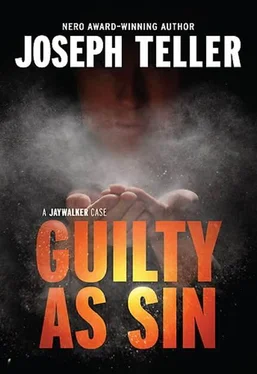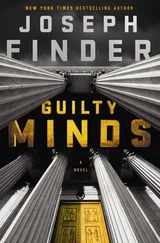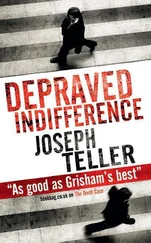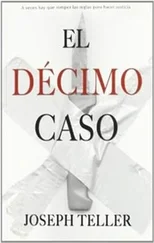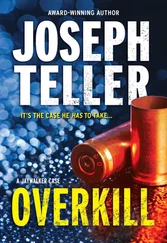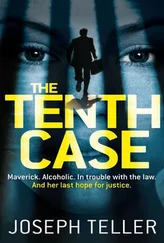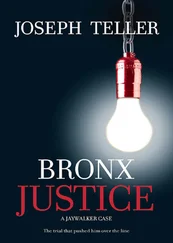Joseph Teller - Guilty As Sin
Здесь есть возможность читать онлайн «Joseph Teller - Guilty As Sin» весь текст электронной книги совершенно бесплатно (целиком полную версию без сокращений). В некоторых случаях можно слушать аудио, скачать через торрент в формате fb2 и присутствует краткое содержание. Жанр: Криминальный детектив, на английском языке. Описание произведения, (предисловие) а так же отзывы посетителей доступны на портале библиотеки ЛибКат.
- Название:Guilty As Sin
- Автор:
- Жанр:
- Год:неизвестен
- ISBN:нет данных
- Рейтинг книги:5 / 5. Голосов: 1
-
Избранное:Добавить в избранное
- Отзывы:
-
Ваша оценка:
- 100
- 1
- 2
- 3
- 4
- 5
Guilty As Sin: краткое содержание, описание и аннотация
Предлагаем к чтению аннотацию, описание, краткое содержание или предисловие (зависит от того, что написал сам автор книги «Guilty As Sin»). Если вы не нашли необходимую информацию о книге — напишите в комментариях, мы постараемся отыскать её.
Guilty As Sin — читать онлайн бесплатно полную книгу (весь текст) целиком
Ниже представлен текст книги, разбитый по страницам. Система сохранения места последней прочитанной страницы, позволяет с удобством читать онлайн бесплатно книгу «Guilty As Sin», без необходимости каждый раз заново искать на чём Вы остановились. Поставьте закладку, и сможете в любой момент перейти на страницу, на которой закончили чтение.
Интервал:
Закладка:
Not that he wouldn’t blame himself anyway.
Now, as he watched Alonzo Barnett raise his right hand as instructed and place his left upon a book that had no place in his particular religion, Jaywalker sensed the enormity of the task in front of both of them. Until this moment, the trial had pretty much followed the familiar script of all sale cases. A midlevel law enforcement official-in this instance Lieutenant Dino Pascarella-had set the table for the jurors, describing the receipt of an anonymous phone tip about a man dealing drugs. Surveillance of the man had proved of limited value. A veteran undercover officer had been brought in from out of state. That undercover officer, Agent Trevor St. James, had described his success in gaining the unwitting confidence of an associate of the suspect, a man known to him only as “Stump.” Following an introduction to the suspect, Agent St. James had ordered heroin from the target three times, each time in dramatically escalating amounts. Twice the deals had been completed. On the third occasion the target had been arrested just prior to making delivery. On his person had been not only the drugs, but some of the prerecorded money St. James had given him earlier.
Three additional witnesses had been called by the prosecution. Two members of the backup team, Agent Angel Cruz and Investigator Lance Bucknell, had described their roles in the surveillance and arrest of the defendant. And a chemist, Olga Kasmirov, had certified that on each of the three occasions, the drugs sold or seized had contained heroin.
So it was all there, neatly laid out, wrapped up and tied with a bow. An absolute lock, in the jargon of prosecutors. A dead-bang loser, any defense lawyer would have called it. And were you to take those two polar opposites and try to reconcile them, you’d end up with a third phrase. A guilty plea, it was called, and it was how such differences were invariably settled.
Only not in this case.
In the matter of The People of the State of New York versus Alonzo Barnett, the rule had been broken, the script tossed aside. There’d been no guilty plea. Instead there’d been a trial, a trial that had finally come down to its last witness.
Now, as Jaywalker sat and listened as his client swore to tell the truth, the whole truth and nothing but the truth, he knew how powerless he was to change the story the prosecution witnesses had recounted. This wasn’t one of those cases, after all, where there were two competing versions of the facts. Just about everything Pascarella and St. James and Cruz and Bucknell and Kasmirov had testified to was true. Alonzo Barnett had indeed sold heroin twice and been caught in the act of doing it a third time. Now he was about to confirm that, waiving his constitutional right to silence so that he could admit it under oath in open court. He was going to tell the jurors, in other words, that he was guilty, exactly as charged.
Why?
It was a question Jaywalker had been asking for several months now, first of Barnett and eventually of himself. A question that had occurred to him even before the two of them had met, way back when Lorraine Wilson had called him with the assignment, and he’d read the charges and examined the court file. A question that had nagged at him when he’d realized early on that only two things were likely to result from a trial. First, Barnett would end up serving substantially more time than if he had taken a plea. Second, Jaywalker would lose. Now, a week into the trial, those two things seemed as inevitable as they ever had.
Yet a few things had changed.
For starters, the way the investigation had been conducted had raised more questions for Jaywalker than it answered. Had there really been an anonymous phone call, or was that a fabrication? Had the case truly been made without the use of a confidential informer? Why had Stump, now known to be Clarence Hightower, been treated with such unusual deference? And why hadn’t more of an effort been made to identify, arrest and prosecute Barnett’s source of supply?
But it wasn’t just the answers to these questions that eluded and intrigued Jaywalker. It was the way each question interlocked with the next one. Was it merely coincidental that they had all arisen in the same case? Or was there a pattern to them, a pattern that Jaywalker was for some reason unable to discern? Was he onto something that lay just out of sight? Or was his searching for it just the latest example of his penchant for tilting at windmills? A comment came back to him, something uttered by a client of his long ago, as he’d sat on a secure psychiatric ward in Bellevue Hospital. The guy’s name had been Simberg, William Simberg, and he’d been locked up-again-this time for accusing the police commissioner of watching his every move or the mayor of monitoring his thought waves. Something along those lines.
“Just because I happen to be a diagnosed paranoid schizophrenic,” Simberg had whispered to Jaywalker, “doesn’t mean I’m not being followed.”
So maybe Jaywalker was just being his usual obsessive self, asking questions for which there were no answers, searching for patterns where there were none to be found. But then again…
Something else had changed, too.
Over the weeks since Jaywalker had accepted the assignment and agreed to represent a defendant who’d already been through several other lawyers, he’d gotten to know the man behind the name. The charges and the court papers and the rap sheet had promised a hard case, a career criminal who’d spent half his life in prison without ever learning a thing from it. And when Alonzo Barnett had predictably insisted on a trial in spite of his admitted and demonstrable guilt, Jaywalker had resigned himself to a menu of extremely limited choices. Talk him out of it or go down with him.
But the Alonzo Barnett who’d gradually emerged from the file had surprised him. Here was a man who’d come from absolutely nothing, been through terrible adversity, and finally managed to turn things around completely. And then, just when he’d been firmly on the road to redemption, a tragic flaw had tripped him up, a misguided sense that he still owed a debt he’d incurred long ago. Yet even when things had imploded and he’d landed back in jail, he hadn’t rued repaying that debt, railed against the fates or whined over his predicament. He’d simply asked for a chance to tell his story, to speak and to be heard. And Jaywalker?
Jaywalker had been drawn to this defendant as he’d been drawn to few others in his career. There was a nobility to Alonzo Barnett, a calm, quiet grace that Jaywalker had never quite encountered before in a client, whether through the bars of a jailhouse or across the desk in his office. In spite of Barnett’s long and serious criminal record, in spite of the horribly self-destructive life choices he’d made, in spite of his ultimate willingness to trade heroin for money, Jaywalker had come to feel a unique connection to this particular man. By the time he rose from his seat and stepped to the podium to ask his first question on direct examination, he’d gotten to know and like Alonzo Barnett in a way he would have had great difficulty describing to a stranger. Hell, he’d had great difficulty describing it to his wife, who’d accused him of getting soft and mushy in his old age, and over an admitted heroin dealer, of all people.
So the question people would be forever asking Jaywalker would turn out to be the wrong one after all. It shouldn’t be “How can you possibly represent someone you know is guilty?” The answer to that one was easy. It was because it was his job, so he did it the same way he would have done any other job, the best way he knew how. The far more interesting question, at least in this particular case, had become “How do you go about representing a defendant who admits his guilt, but whose conviction would bring about an infinitely greater injustice than his acquittal would?”
Читать дальшеИнтервал:
Закладка:
Похожие книги на «Guilty As Sin»
Представляем Вашему вниманию похожие книги на «Guilty As Sin» списком для выбора. Мы отобрали схожую по названию и смыслу литературу в надежде предоставить читателям больше вариантов отыскать новые, интересные, ещё непрочитанные произведения.
Обсуждение, отзывы о книге «Guilty As Sin» и просто собственные мнения читателей. Оставьте ваши комментарии, напишите, что Вы думаете о произведении, его смысле или главных героях. Укажите что конкретно понравилось, а что нет, и почему Вы так считаете.
